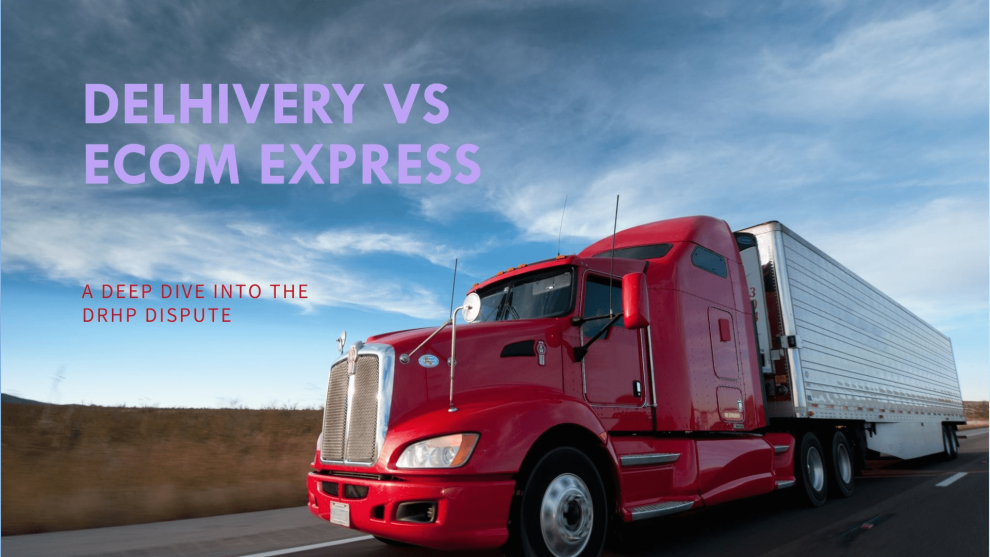In a significant turn of events in India’s logistics sector, Delhivery, a prominent logistics unicorn, has raised serious concerns about its IPO-bound rival, Ecom Express. The heart of the matter lies in discrepancies between the data reported by Ecom Express in its draft red herring prospectus (DRHP) and the figures presented by Delhivery. This editorial explores the intricacies of this dispute, its implications for the logistics industry, and what it means for investors and stakeholders.
The Dispute Unfolds
The clash between Delhivery and Ecom Express centers on alleged inaccuracies in Ecom Express’s DRHP. Delhivery has claimed that Ecom Express has misrepresented key metrics, including shipment volumes, profitability, and capacity. This is not just a technical disagreement but a matter with significant implications for market perceptions and investor decisions.
Shipment Volume: A Tale of Two Counting Methods
One of the primary points of contention is the way shipment volumes are reported by both companies. Here’s a breakdown of the differences:
- Delhivery’s Counting Method: Delhivery reports a shipment as a single transaction, regardless of whether the shipment is delivered or returned to origin. This method provides a straightforward count of transactions.
- Ecom Express’s Counting Method: Ecom Express, on the other hand, counts both the outbound and return trips as separate shipments. This results in a higher reported number of shipments.
For instance, Delhivery reported a shipment volume of 740 million for FY24. Ecom Express reported 514 million shipments. When adjusted for the industry average return-to-origin rate of 14-18%, Delhivery argues that Ecom Express’s shipment volume should be closer to 450 million. This adjustment raises questions about the comparability of the two companies’ reported volumes.
Cost Per Shipment (CPS): Analyzing the Impact
The difference in counting methods also affects the cost per shipment (CPS) metrics. CPS is calculated by dividing the total costs directly attributable to operations by the number of shipments handled. Delhivery’s analysis suggests that Ecom Express’s CPS may be understated due to the inflated shipment volume figures.
According to Delhivery, adjusting Ecom Express’s CPS for comparable shipment volumes would result in an increase of approximately Rs 7, or about 15%. This adjustment could alter investors’ perception of Ecom Express’s cost efficiency and profitability relative to Delhivery.
Why This Matters
The discrepancies highlighted by Delhivery are more than just technical issues; they have broader implications for the logistics sector and the investment community. Here’s why this dispute is significant:
Investor Confidence
Accurate and transparent reporting is crucial for maintaining investor confidence. Investors rely on DRHPs to assess the financial health and competitive positioning of companies. Misleading or incorrect data can lead to poor investment decisions and financial losses. The allegations by Delhivery underscore the need for rigorous standards in reporting and transparency.
Competitive Landscape
The logistics sector in India is highly competitive, with companies like Delhivery and Ecom Express vying for market share. Accurate data is essential for a fair competitive environment. Discrepancies in reported metrics can distort the competitive landscape and affect strategic decisions made by investors and stakeholders.
Regulatory Oversight
As the logistics sector continues to grow, regulatory bodies are likely to impose stricter standards for financial reporting and transparency. The dispute between Delhivery and Ecom Express may prompt increased scrutiny from regulators, leading to more stringent requirements for companies preparing for IPOs.
The Broader Context
The logistics industry in India is undergoing rapid transformation, driven by technological advancements and rising demand for efficient supply chain solutions. Both Delhivery and Ecom Express are at the forefront of this evolution, leveraging technology to enhance operational efficiency and service delivery.
Technological Advancements
Technology plays a crucial role in modern logistics, offering solutions for tracking, data analysis, and process optimization. Companies in the sector are investing heavily in technology to stay competitive. However, this reliance on technology also highlights the need for accurate data reporting to avoid discrepancies.
Industry Challenges
The logistics sector faces several challenges, including:
- Data Accuracy: Ensuring consistent and accurate data reporting is essential for maintaining investor trust and competitive fairness.
- Operational Efficiency: Companies must continually innovate to enhance efficiency and reduce costs.
- Regulatory Compliance: Adhering to regulatory standards is crucial for maintaining credibility and avoiding legal issues.
Moving Forward
The dispute between Delhivery and Ecom Express is a reminder of the importance of transparency and accuracy in financial reporting. As the logistics sector continues to evolve, it is crucial for companies to adhere to rigorous reporting standards and provide investors with reliable information.
The resolution of this dispute will be closely monitored by industry stakeholders and investors. It could set a precedent for future IPO filings and corporate disclosures, highlighting the need for integrity and transparency in the financial reporting process.
In conclusion, the allegations by Delhivery against Ecom Express’s DRHP bring to light critical issues that extend beyond mere data discrepancies. The outcome of this dispute will have significant implications for the logistics sector and the broader investment community. As we await further developments, it is clear that accurate and transparent reporting remains a cornerstone of trust and fairness in the business world.
Idea Courtesy: Money Control.
For more insights on SME, Startup and Businesses, visit BharatiyaMedia.com. For editorial inquiries, email sharma.maayank@yahoo.com, and for advertisements and other enquiries, contact us at contact@entrepreneur.org.in.
Read these article also:
The Surge of SME and Startup IPOs on BSE and NSE: Trends, Benefits, and Challenges
How to Start an E-commerce Business: A Comprehensive Guide for Beginners
Boosting Innovation: Research & Development in Processed Food












Add Comment